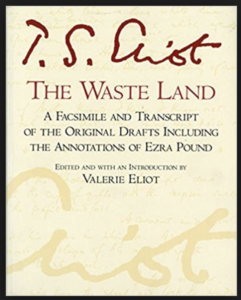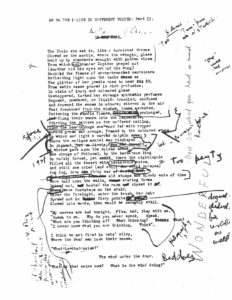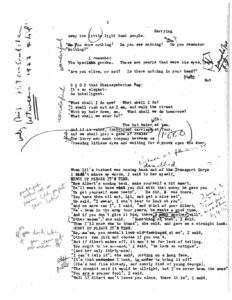[This is a text version of a paper given at the T. S. Eliot Society Annual Meeting, held at Emory University on 22 September 2018. I was part of a roundtable titled “Reading The Waste Land With the #MeToo Generation.” My fellow panelists and I were each asked to choose a section of the poem and a keyword. I chose lines 111-138 or so, the middle section of “A Game of Chess,” and the keyword I selected is “Boundaries.”]
Boundaries
The keyword I have chosen is “Boundaries.” I’m thinking about boundaries as they relate to “A Game of Chess,” specifically the middle portion of the poem, which begins with “My nerves are bad tonight.” This is the section on which Ezra Pound comments “photography?” and also the section which features annotations not only by Pound, but also by Eliot’s first wife, Vivien. I selected this episode because it demonstrates to me one of the most important and most difficult elements of #MeToo: the messiness of boundaries: emotional, intellectual, physical, and (in this case) textual.

Cover of the paperback edition of the facsimile edition of T. S. Eliot’s poem The Waste Land
Essential to my reading of the poem is the facsimile edition of the manuscript, which was first published in 1971 and edited by Eliot’s second wife Valerie. This edition sent shock waves through the world of modernist poetics by forcing scholars to acknowledge, in Eliot’s own words, “the extent of my debt to Ezra (Pound).” But as I’ve already suggested, the manuscript reveals another debt as well, the debt to Eliot’s wife. To be clear, I am not suggesting that Vivien Eliot’s contributions to The Waste Land should overshadow Pound’s. Her marks on the facsimile manuscript are confined to a few pages, and Pound’s marginalia is far more extensive. But, while my colleagues have focused their remarks on representations of women in the poem, I want to complicate things by adding a real woman into the mix. “A Game of Chess” not only features several different female voices (Cleopatra, Viv and her “friend” and the woman with the bad nerves), it also features material traces left by an actual female hand, marks that offer comments and suggest emendations. In other words, while it’s important to thing about the ways that representations of women circulate within the poem, it’s also crucial to attend to the real human beings for whom these representations are more than mere abstractions.
“A Game of Chess” as I have argued elsewhere (at this conference, actually, back in 2009!) is a poem that is deeply concerned with heterosexual intimacy, both physical and emotional. The section that I’m focusing on, “My nerves are bad tonight” has been read by both critics and those who knew the Eliots personally, as a portrait of the couple’s marriage. “Photography?” Pound inquires in his crayon scrawl. In her notes to the facsimile, Valerie Eliot interprets this comment as “Implying too realistic a reproduction of an actual conversation (126). If it is a photograph of a marriage, whether the Eliots’ or someone elses’, what does that photo show us? What, in other words, is the poem’s vision of marital intercourse? (Spoiler alert: It’s not good).

Facsimile reproduction of “A Game of Chess” from The Waste Land Facsimile Edition (Houghton Mifflin, 1974) Edited by Valerie Eliot
‘My nerves are bad tonight. Yes bad. Stay with me.
‘Speak to me. Why do you never speak. Speak.
‘What are you thinking of? What thinking? What?
‘I never know what you are thinking. Think.’
<😬>
Anxiety. Desperation. Isolation. Neurosis. . . And that’s just the first few lines. The poem continues:
I think we are in rats’ alley
Where the dead men lost their bones.
This portrait is not a vision of marital bliss–not even close. The female speaker desperately longs for companionship and sympathy from her partner, and he quite obviously wants to have nothing to do with her but is unable to escape the sound of her voice. Despite the fact that he never speaks (there are no quotation marks around his side of the discourse), she seems to be intuiting his thoughts and repeating key words and phrases back to him. The couple thus present us with a nightmarish version of intimacy: all boundaries between the man and woman have disintegrated. Even the unspoken thoughts of one find their way into the consciousness of the other. There is no such thing as privacy—even inside one’s own head.

Facsimile reproduction of “A Game of Chess” from The Waste Land Facsimile Edition (Houghton Mifflin, 1974) Edited by Valerie Eliot
This section of the poem highlights the dark side of intimacy. Marriage in the world of the poem seems to be ill-advised for all sorts of reasons. It is exploitation, invasion, suffocation—even harmful to one’s health if we keep reading a few lines further when we get to Lil . . . and yet, at the most elemental level of textual production, the facsimile edition points to a successful and positive marital collaboration. That is, the poem’s depiction of marriage in its thematic sense is fundamentally incompatible with its status as a material artifact.
On a textual level, at the exact moment that Eliot’s speaker (who may be a poetic version of Eliot himself) is desperately trying to shut out the female voice of his companion (who may represent his real-life wife), the poet is gladly letting her in by incorporating her suggestions written in the margins of the manuscript into the body of the text. And she, for her part, is applauding Eliot’s depiction of what seems to be a truly wretched relationship, which may well be a vision of their own marriage, by proclaiming WONDERFUL! Not once or twice but THREE times alongside these lines of the poem. Put another way, the poem says one thing and does another. And in both cases, at heart is the line which divides one individual from another (or it’s lack).
Boundaries.
In one sense, this section of The Waste Land is all about the problems that come from a lack of boundaries: what happens when we don’t see them, don’t observe them, don’t respect them (don’t have them?). We have a terrifying vision of post-war mind-meld where anxiety and neurosis travel freely from one psyche to the other.
But on a textual level, the poem is also enacting the productive possibilities of border crossings: collaboration. Tending to these material particulars brings me, I hope, back around #MeToo. I’m not advocating for the dismissal of boundaries. Not at all. If anything, I think that this part of “A Game of Chess” highlights the need for clear and legible lines. When we have them (and can read them), they can facilitate powerful collaborative exchanges, such as the ones that we see in the manuscript of this part of the poem. But the passage should also serve as a reminder of the dark side of such boundaries: the consequences of their violation.
